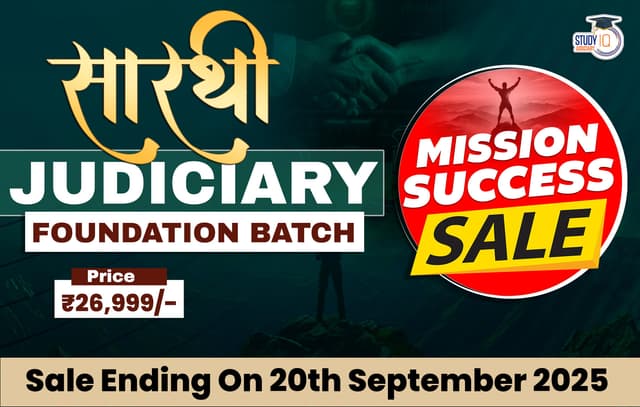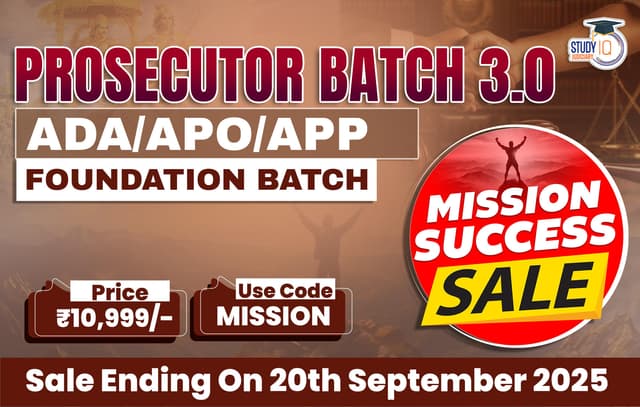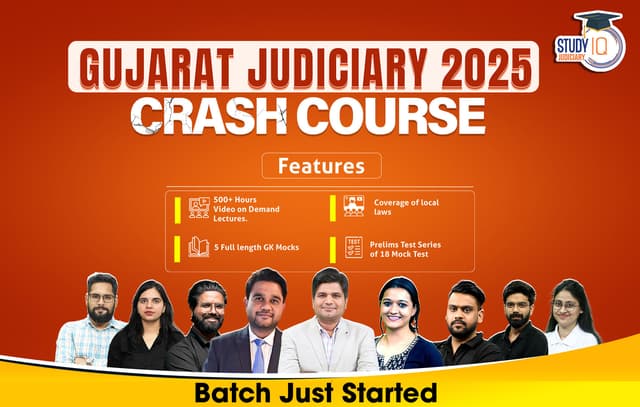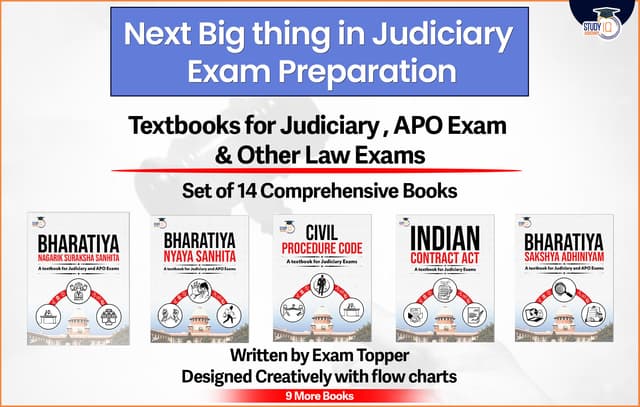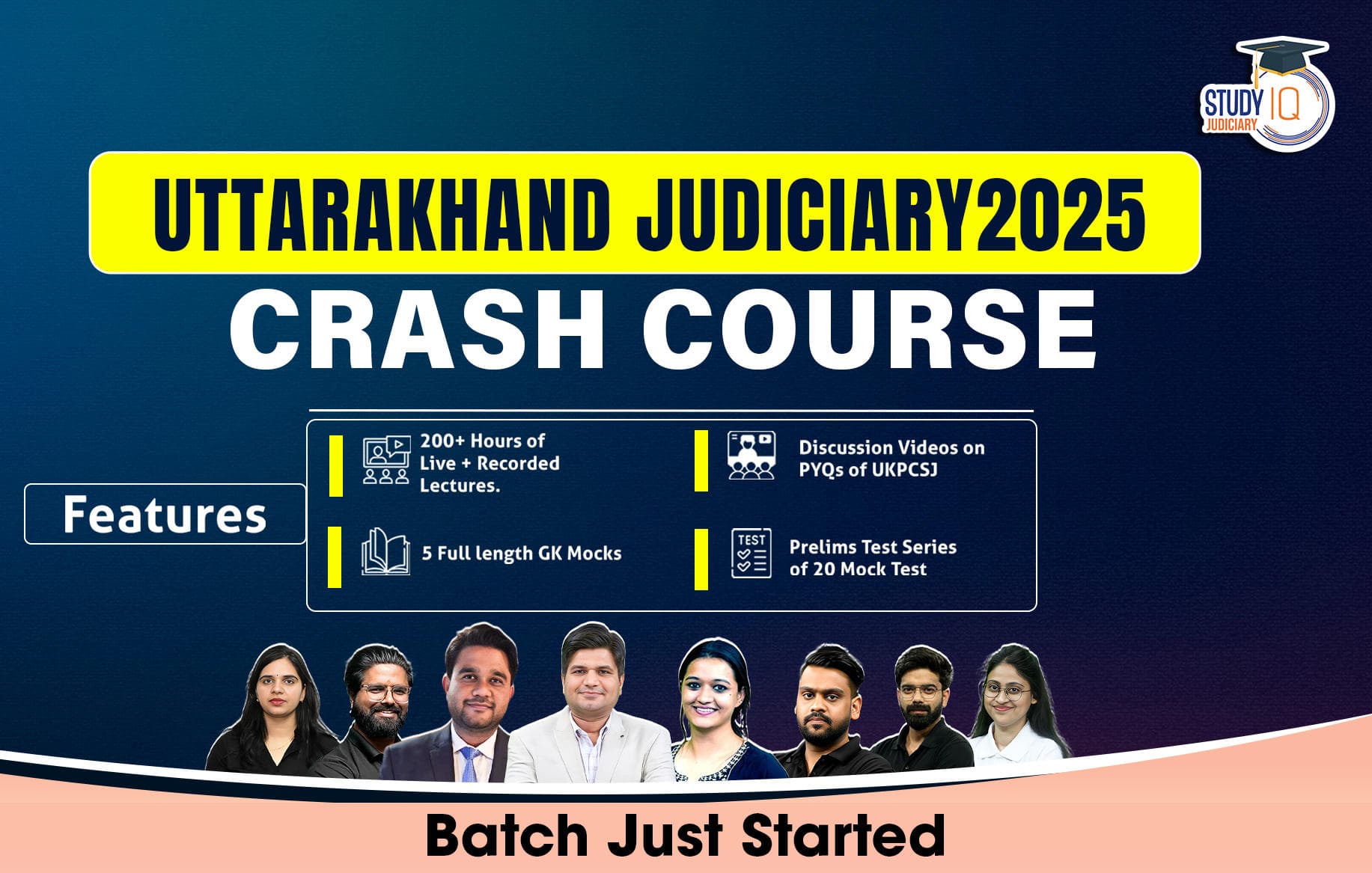Table of Contents
The first step towards success in the Gujarat High Court state-level judicial service exam is to understand the Gujarat Judiciary Syllabus and the format going forward. The Gujarat Judiciary exam is conducted in three phases: Prelims, Mains, and Interview, as the exam rigorously assesses a candidate’s judicial knowledge, language abilities (English and Gujarati), and judicial aptitude. In this article, I will outline the detailed Gujarat Judiciary Syllabus, topic-wise subjects, exam pattern, marking scheme, and what you must focus on while preparing for the exam. This article will be helpful whether you are a first-time candidate or a retaker for the Gujarat Judiciary exam. You can download the official Gujarat Judiciary syllabus PDF document inside.
Gujarat Judiciary Syllabus 2025
The syllabus for the Gujarat Judiciary covers a wide range of topics, which are relevant to the knowledge of laws, language competencies, and analytical skills; the syllabus for Prelims comprises, among other topics, the Indian Penal Code, CPC, CrPC, Constitution, and Evidence Act, while the Mains exam is descriptive, and focuses on Civil and Criminal Laws, as well as language papers in English and Gujarati; the Interview exam assesses personality, ethics, and real-world comprehension of law. A more strategic alternative for full preparation is required.
| Particulars | Details |
|---|---|
| Exam Name | Gujarat Judicial Services Exam |
| Conducting Authority | Gujarat High Court |
| Post | Civil Judge |
| Exam Stages | Preliminary (Objective), Mains (Descriptive), Viva-Voce (Interview) |
| Mode of Exam | Offline (Written and Oral) |
| Prelims Subjects | General Knowledge, Constitution, IPC, CPC, CrPC, Evidence Act, English, etc. |
| Mains Subjects | Criminal Law, Civil Law, Gujarati and English Language Papers |
| Interview (Viva-Voce) | Personality, Legal Aptitude, Ethics, and Practical Knowledge |
| Eligibility Criteria | Law Graduate (LLB) + Enrollment as Advocate with Bar Council |
| Age Limit | 21 to 35 years (relaxations applicable) |
| Official Website | https://gujarathighcourt.nic.in |
Exam Pattern for Gujarat Judiciary Syllabus
| Sr. No | Examination | Exam Type | Duration | No. of Questions | Marks |
| 1 | Prelims Exam (Paper I) | Objective | 2 hours | 100 | 100 |
| Prelims Exam (Paper II: Gujarati Language) | Objective | 1.5 hours | 50 | ||
| 2 | Mains Exam (Paper I) | Description | 3 hours | 100 | |
| Mains Exam (Paper II) | 3 hours | 100 | |||
| 3 | Viva-voce/ Interview | 50 |
Gujarat Judiciary Exam Syllabus 2025
Candidates must be aware of the Gujarat Judiciary exam syllabus so that they concentrate on relevant subjects from the aspect of an exam perspective. To qualify for the cut-off marks of the Gujarat High Court Civil Judge in all the stages, it is necessary to cover the complete GJS exam syllabus as detailed below:
Gujarat Judiciary Syllabus: Prelims
The preliminary examination (elimination test) will have a total of 100 marks. The duration of the exam will be 2 hours, wherein candidates will have Multiple Choice Questions (MCQs), and each question will be 1 mark, while there will be a negative marking of 0.33 marks on each wrong answer.
Candidates obtaining 50% and above marks in the preliminary will be eligible for the Mains exam stage. Marks obtained in the preliminary exam will not be taken into account for preparing the final merit of the candidates.
| Papers | Part | Subject | Marks | Duration |
|---|---|---|---|---|
| Paper I | Part A | Law (Criminal Law) | Combined in Total | Combined in Total |
| Part B | Law (Civil Law) | 100 Marks (Total for Paper I) | 2 Hours | |
| Part C | General Knowledge, English Language, Test of Reasoning, Numerical & Mental Ability, and Basics of Computer Applications | Combined in Total | Combined in Total | |
| Paper II (Only for candidates who haven’t passed Secondary & Higher Secondary with Gujarati subject) |
— | Test of the Gujarati Language | 50 Marks | 1½ Hours |
The Gujarat Judiciary syllabus prelims for the Gujarat Civil Judge post exam is given below-
| Paper | Part | Topics Covered |
|---|---|---|
| Paper I | Part A – Criminal Law | – Indian Penal Code, 1860 – Code of Criminal Procedure, 1973 – Indian Evidence Act, 1872 – Gujarat Prohibition Act, 1949 – Negotiable Instruments Act, 1881 – Probation of Offenders Act, 1958 – Juvenile Justice Act, 2015 – Protection of Women from Domestic Violence Act, 2005 – Gujarat Prevention of Gambling Act, 1887 – Immoral Traffic (Prevention) Act, 1956 – Pre-conception and Pre-Natal Diagnostic Techniques Act, 1994 – Registration of Births and Deaths Act, 1969 – Protection of Children from Sexual Offences Act, 2012 – Information Technology Act, 2000 – Indecent Representation of Women (Prohibition) Act, 1986 |
| Part B – Civil Law | – Code of Civil Procedure, 1908 – Limitation Act, 1963 – Indian Contract Act, 1872 – Constitution of India – Indian Partnership Act, 1932 – Specific Relief Act, 1963 – Gujarat Court Fees Act, 2004 – Sale of Goods Act, 1930 – Transfer of Property Act, 1882 – Arbitration and Conciliation Act, 1996 – Commercial Courts Act, 2015 – Succession Laws, Personal Laws (Hindu, Muslim & Christian) – Legal Maxims | |
| Part C – General Knowledge, Language, Reasoning & Others | General Knowledge: – Government schemes – Fiscal/Monetary/Financial Policy – Banking & Finance Terms – Abbreviations – Important Days & Events – Indian Constitution English Language: – Reading Comprehension – Fill in the Blanks – Error Spotting – Sentence Rearrangement – Para Jumbles – Antonyms & Synonyms – Match the Following – Sentence Connectors Reasoning: – Puzzle, Statements & Assumptions – Ranking, Coding-Decoding – Seating Arrangement – Syllogism, Blood Relations – Direction Test, Inequalities – Series, Logical Reasoning – Alphanumeric Series Numerical & Mental Ability: – Data Interpretation – Number Series, Approximation – Profit & Loss, Simple Interest – Quadratic Equations – Partnership, Mixture & Allegations Computer Basics: – Components of Computers – Computer Networks & Storage – Generations of Computers – Input & Output Devices – MS Office, MS Word | |
| Paper II (Only for candidates who haven’t passed Secondary & Higher Secondary with Gujarati) | Gujarati Language Test | – નિબંધ લેખન (Essay Writing) – પ્રશ્નોના જવાબ (Answering Questions on Ideas) – સમાનાર્થી અને વિરુદ્ધાર્થી શબ્દો (Synonyms & Antonyms) – પત્રલેખન (Letter Writing) – અનુવાદ (Translation – Gujarati ↔ English) – ટંકલિપિ નોંધ (Note-making on any topic) – વ્યાકરણ (Grammar) |
Gujarat Judiciary Syllabus: Mains
writing format, with 3 hours assigned for each paper. Each of the question papers of the Mains examination shall be of 100 marks each.
| Paper | Subject | Maximum Marks | Duration |
| Paper I | Criminal Law | 100 | 3 hours |
| Paper II | Civil Law | 100 | 3 hours |
| Total | 200 | 6 hours | |
The Gujarat Judiciary Mains syllabus has a greater emphasis on the questions that pertain to domain knowledge. The Gujarat HC Civil Judge for the descriptive main examination is illustrated in the following table:
| Paper | Subject | Topics Covered |
|---|---|---|
| Paper I | Criminal Law | – Indian Penal Code, 1860 – Code of Criminal Procedure, 1973 – Indian Evidence Act, 1872 – Gujarat Prohibition Act, 1949 – Probation of Offenders Act, 1958 – Juvenile Justice Act, 2015 – Protection of Women from Domestic Violence Act, 2005 – Gujarat Prevention of Gambling Act, 1887 – Immoral Traffic (Prevention) Act, 1956 – Pre-conception and Pre-Natal Diagnostic Techniques Act, 1994 – Negotiable Instruments Act, 1881 – Registration of Births and Deaths Act, 1969 – Protection of Children from Sexual Offences Act, 2012 – Information Technology Act, 2000 – Indecent Representation of Women (Prohibition) Act, 1986 |
| Paper II | Civil Law | – Code of Civil Procedure, 1908 – Limitation Act, 1963 – Indian Contract Act, 1872 – Constitution of India – Indian Partnership Act, 1932 – Specific Relief Act, 1963 – Gujarat Court Fees Act, 2004 – Sale of Goods Act, 1930 – Transfer of Property Act, 1882 – Arbitration and Conciliation Act, 1996 – Commercial Courts Act, 2015 – Succession Laws & Personal Laws (Hindu, Muslim & Christian) – Legal Maxims |
Gujarat Judiciary Syllabus: Interview
Candidates qualifying in the Mains examination will be shortlisted for the Viva Voce test round. The Viva Voce test shall be conducted for 50 marks.
In this Viva-Voce, Gujarat High Court Officials will analyze the following in the candidates:
- Mental alertness
- Knowledge of the law
- Clear and logical exposition
- Balance of judgment
- Skills, attitude, ethics
- The power of assimilation
- The power of communication
- Character and intellectual depth
- Analytical ability
Best Books to Cover Gujarat Judiciary Syllabus
| Subject | Recommended Books |
|---|---|
| Constitution of India | Introduction to the Constitution of India by D.D. Basu |
| Indian Penal Code (IPC) | Indian Penal Code by K.D. Gaur or Ratanlal & Dhirajlal |
| Code of Civil Procedure (CPC) | The Key to CPC by Hemant Khatri or CPC by Takwani |
| Code of Criminal Procedure (CrPC) | CrPC by R.V. Kelkar or Criminal Procedure by K.N. Chandrasekharan Pillai |
| Indian Evidence Act | Law of Evidence by Batuk Lal or Vepa P. Sarathi |
| General Knowledge + Current Affairs | Lucent’s General Knowledge + Daily Current Affairs from The Hindu or Indian Express |
| English Language | Objective General English by S.P. Bakshi |
| Gujarati Language | State Board Gujarati Grammar Books or Local Language Guides |

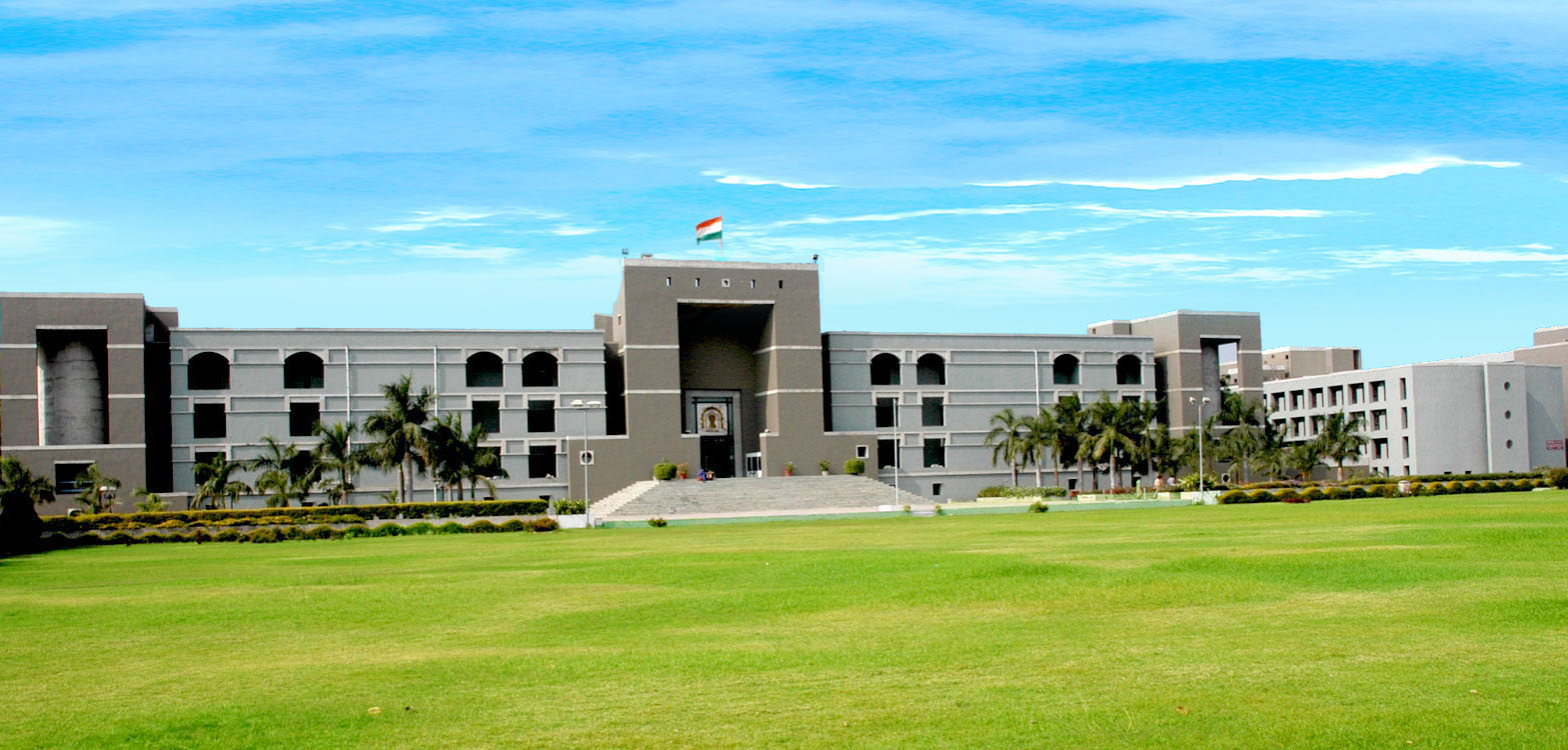
 Supreme Court Law Clerk Recruitment 2026...
Supreme Court Law Clerk Recruitment 2026...
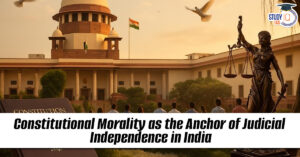 Constitutional Morality as the Anchor of...
Constitutional Morality as the Anchor of...
 Insider Trading in the Age of Social Med...
Insider Trading in the Age of Social Med...

